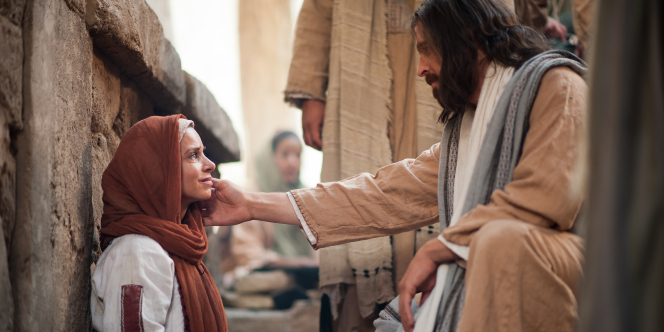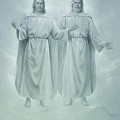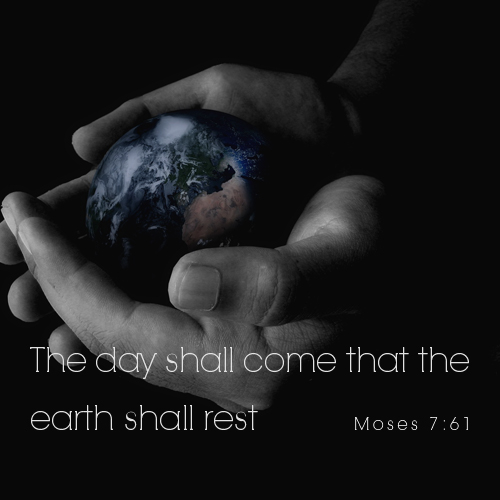This articlePutting Doubt into Perspective was originally published in Meridian Magazine.
Read Part 1 of this article.
Nowhere in the scriptures are we told that we should choose to doubt. In fact, we are repeatedly told that we should avoid doubt. Christ said to his disciples: “Neither be ye of doubtful mind.” (Luke 12:29. See also Matthew 21:21 and Mark 11:23.) The Lord told Joseph Smith and Oliver Cowdery to “Look unto me in every thought; doubt not, fear not” (Doctrine & Covenants 6:36). And Moroni counsels all of us to “Doubt not, but be believing” (Mormon 9:27). More recently, President Thomas S. Monson said,
Do not yield to Satan’s enticements; rather, stand firm for truth. . . . Vice never leads to virtue. Hate never promotes love. Cowardice never gives courage. Doubt never inspires faith.
In other words, as between doubt and faith, we should choose faith. (See also Helaman 5:49 and Mormon 9:21 & 25.)
That is not to say that we should not be inquisitive or that it is wrong to ask questions, or wonder about things. In fact, we are admonished to ask, seek and knock (3 Nephi 14: 7 & 27:29; Matthew 7:7; Doctrine & Covenants 6:5). We are to worship God not only with our heart, but also with our minds (Mark 12:30; 2 Nephi 25:29; Moroni 10:32). We are told “with all thy getting, get understanding” (Proverbs 4:7). President Dieter F. Uchtforf has said:
Inquiry is the birthplace of testimony. Some might feel embarrassed or unworthy because they have searching questions regarding the gospel, but they needn’t feel that way. Asking questions isn’t a sign of weakness; it’s a precursor of growth. …
Fear not; ask questions. Be curious, but doubt not! Always hold fast to faith and to the light you have already received. Because we see imperfectly in mortality, not everything is going to make sense right now. In fact, I should think that if everything did make sense to us, it would be evidence that it had all been made up by a mortal mind. Remember that God has said: “My thoughts are not your thoughts, neither are your ways my ways. …”
We are also told that some kinds of revelation come only after we have studied things out in our minds. (See Doctrine & Covenants 9:8.) Alma taught us to use both our intellectual as well as spiritual faculties to experiment upon the word (Alma 32:27). John taught us to test the spirits to see if they are of God (1 John 4:1). Similarly, Paul taught us to “Prove all things” (1 Thessalonians 5:21). We are told to diligently teach and seek “out of the best books words of wisdom.” We are to “seek learning, even by study and also by faith.” (Doctrine & Covenants 88:118; Doctrine & Covenants 109:7 & 14.) So as we ask, seek and knock, we are to do so in a spirit of faith, not in a spirit of cynicism, bitterness or doubt (James 1:5-6).
Nourishing Your Testimony
Nevertheless, although we should try to avoid complacently accepting doubt, it is not a sin to be tempted by doubt. But thoughts and feelings of doubt do not need to be indulged. It has been said that a bird may land on your head, but you don’t need to let it build a nest there. So, like other temptations of the mind, thoughts of doubt about God and His Church may enter our heads, but there is no sin in that unless we choose to cultivate, embrace or act on those thoughts.
A helpful analogy in this regard is that of Alma’s garden in Alma 32:27-43. Alma teaches us to plant the seeds of faith in the garden of our hearts and nourish and cultivate the seeds to see if they will bear good fruit and prove themselves to be good seeds. We move from faith to knowledge as the seeds grow, enlarge our souls, enlighten our understanding and expand our minds (Alma 32:33-34).
However, bad seeds, seeds of doubt and apostasy, can also fall into our gardens. So, just as it is important to nourish the good seeds, we should avoid nourishing the bad seeds so they do not choke out the good seeds. If we cultivate seeds of faith, we will reap the fruits of faith: knowledge and eternal life. If we cultivate seeds of doubt, we will harvest the fruits of apostasy.
Elder Neal A. Maxwell similarly applied this analogy [Neal A. Maxwell, Meek and Lowly (Salt Lake City: Deseret Book, 1987), 6.]:
Lack of intellectual humility is there among those who have deliberately cultivated their doubts in order, they think, to release themselves from their covenants. Some nurture their grievances assiduously. Were their grievances, instead, Alma’s seed of faith, they would have long ago nourished a mighty tree of testimony.
Much of the work organizations such as FairMormon do are to provide ways for people to identify the bad seeds and to give people the tools they need to pull the weeds from the gardens of their hearts. Of course, it is not possible for FairMormon to destroy all the seeds of doubt. If it were, as Professor Terryl Givens points out, people would not be free to choose faith as they would have no options. Furthermore, while FairMormon can help give people the tools they need to remove the weeds from their gardens, a garden will still not bear fruit if no one has made an effort to plant good seeds and diligently nourish them. As Alma indicated, once the tree of testimony begins to grow, we must continue to exercise faith by nourishing the tree so that we may one day eat the fruit of the tree, which is everlasting life (Alma 32:36-43). Elder Neil L. Andersen discussed how we can strengthen our testimonies in the face of trials:
How do you remain “steadfast and immovable” during a trial of faith? You immerse yourself in the very things that helped build your core of faith: you exercise faith in Christ, you pray, you ponder the scriptures, you repent, you keep the commandments, and you serve others.
When faced with a trial of faith-whatever you do, you don’t step away from the Church! Distancing yourself from the kingdom of God during a trial of faith is like leaving the safety of a secure storm cellar just as the tornado comes into view.
Elder Quentin L. Cook further taught us what to avoid:
Many who are in a spiritual drought and lack commitment have not necessarily been involved in major sins or transgressions, but they have made unwise choices. Some are casual in their observance of sacred covenants. Others spend most of their time giving first-class devotion to lesser causes. Some allow intense cultural or political views to weaken their allegiance to the gospel of Jesus Christ. Some have immersed themselves in Internet materials that magnify, exaggerate, and, in some cases, invent shortcomings of early Church leaders. Then they draw incorrect conclusions that can affect testimony. Any who have made these choices can repent and be spiritually renewed.
Avoiding the Seeds of Doubt
Also, in trying to avoid doubt, it can be helpful to avoid those who sow the seeds of doubt. Excessive exposure to people who are bitter, cynical and angry is corrosive and has a tendency to erode faith. Elder Maxwell observed that as we read in the Section 46 of the Doctrine and Covenants, “to some it is given by the Holy Ghost to know that Jesus Christ is the Son of God… to others it is given to believe on their words…” The dark side of that coin, of course, is that doubts can be pooled, too, and anxieties shared with the wrong people so that this wilts such few tender sprouts of certitude as exist. The point is not that we should refuse to share our concerns, but that sincere doubters really seek for answers, while it is often the insincere doubter who wants to play “Can you top this?” in a frenzy of doubt for doubt’s sake. [Neal A. Maxwell, For the Power is In Them…(Mormon Musings) (Salt Lake City: Deseret Book Company, 1970), 31.]
Of course, as we try to cast the seeds of doubt out of our lives, we should not be too quick to cast out the doubters. Some, through no fault of their own, experience doubt and ask questions more than others. Elder Maxwell described different types of doubters in the following way:
You are quite right to be lovingly concerned about doubters, who come in such various shapes and attitudinal shadings. Some doubters truly seek answers. These give the Brethren the benefit of the doubt, and, for them, doubt becomes a useful spiritual spur. There are others who doubt and hold back simply because they are so afraid of being “taken in.” There are still others who are embarrassed because of their inability to defend their faith; for these, doubt is a refuge. Yet other doubters are stubborn, because they feel God has not responded to them on their terms. There are even doubters who come to enjoy their roles and the associated attention and who set themselves up “as a golden calf for the worship” of people in the Church (Doctrine & Covenants 124:84). A variation of the latter is seen in those who are “professing and yet [are] not of God” (Doctrine & Covenants 46:27; see also Doctrine & Covenants 136:19). “He commandeth that there shall be no priestcrafts; for, behold, priestcrafts are that men preach and set themselves up for a light unto the world, that they may get gain and praise of the world; but they seek not the welfare of Zion” (2 Nephi 26:29).
These latter individuals have their own agendum and have apparently long since concluded that, if they can’t be a leader, then they will be a critic.
Absent sufficient meekness in the doubter, I am not sure that much can be done. Experience can either soften or harden doubts, depending on the person’s supply of meekness. Clearly, however, our love should include all doubters, whatever their motivation, “for ye know not but what they will… come unto me with full purpose of heart” (3 Nephi 18:32). [Neal A. Maxwell, That Ye May Believe, Kindle edition, 2026.]
As we strive to spread the gospel and build faith in others, patience and love are necessary if we are to reach those who are struggling, but have not yet surrendered to and embraced doubt. As Elder Maxwell has written:
The ability to create a climate around us in which people, as in the case of the man who approached Jesus, feel free enough to say the equivalent of “Lord, help Thou my unbelief,” is a critical skill. If we can deal with doubt effectively in its nascent stages, we can assist people by a warmth and love which frees them to share the worries that they may have, and increase the probability of dissolving their doubt. But, if we over-react to dissent or to doubt, we are apt, rather than inculcating confidence in those we serve, to exhibit what, in the eyes of the rebel, may seem to be a flaw in our inner confidence in what we say.
We need to relax to be effective in the process of helping people who are building testimonies. Over-reacting and pressing the panic button when doubt first makes its appearance can render us ineffective. This is one of the reasons why parents are often in a temporarily poorer tactical position to deal effectively with a rebellious son or daughter— the anxiety is too real to relax. In these circumstances, bishops, teachers, and friends can be helpful— not because they are clinically detached, for their love and concern should be honestly communicated— but rather because third parties sometimes can listen a little longer without reacting, can prescribe with a clear-headed assessment, and most of all, can be a fresh voice which conveys care and concern, a voice which has risen above similar challenges. [Neal A. Maxwell, A More Excellent Way: Essays on Leadership for Latter-day Saints (Salt Lake City: Deseret Book Company, 1967), 62.]
Doubt is necessary, in the cosmic scheme of things, if we are to experience an authentic test of our true desires, retain our moral agency, and have the kind of full experience we need that will help us to become more like Christ. However, as we better come to appreciate the necessity of doubt, we should be careful to speak of doubt in its proper place. Doubt is a condition to be overcome and not a virtue to be embraced.






